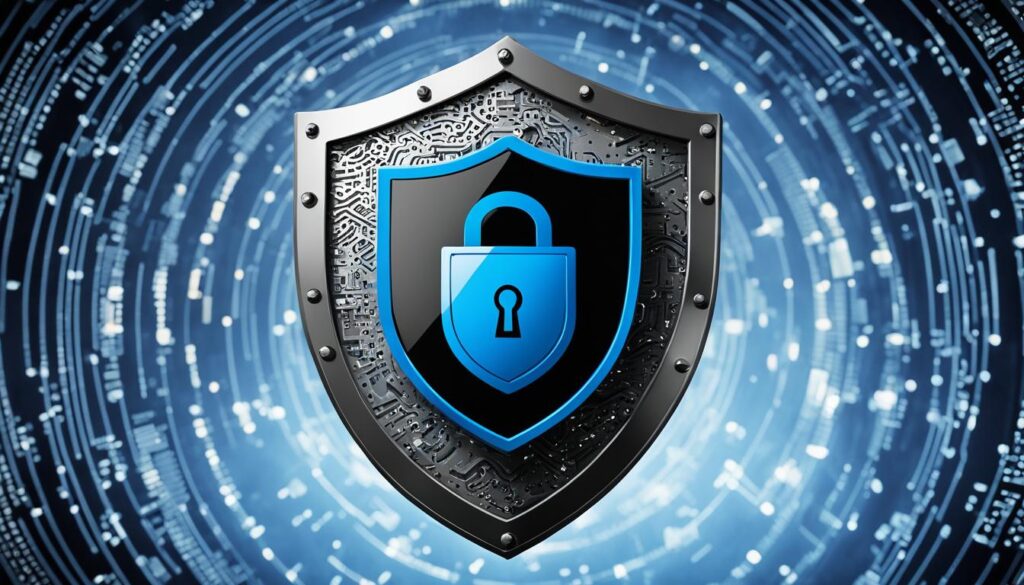This blog post contains affiliate links, and we may receive a commission for purchases made through these links at no additional cost to you.
In today’s digital age, protecting your online privacy has never been more important. With the increasing number of data breaches, online tracking, and surveillance, it is crucial to take proactive steps to safeguard your personal and private information. By implementing these essential tips, you can enhance your online privacy and maintain control over your data.
Key Takeaways:
- 1. Protecting your online privacy is crucial in preventing identity theft and scams.
- 2. Online privacy is influenced by both individual actions and privacy laws.
- 3. Take actionable steps to protect your privacy, including sharing less information, using strong passwords, and utilizing privacy settings.
- 4. Be cautious about data collection on social media platforms and tighten privacy settings.
- 5. Regularly review and update your privacy preferences to stay ahead of potential threats.
How Strong Is Your Online Privacy?
Online privacy is a fundamental right and an essential aspect of maintaining a safe digital environment. It encompasses both your ability and right to keep your personal information to yourself. However, achieving online privacy is not solely dependent on your actions and what you share online; it is influenced heavily by privacy laws, as well as the policies of tech companies and service providers.
Privacy laws play a critical role in protecting your online privacy. They establish guidelines and regulations for how organizations collect, use, and disclose personal data. Sadly, not all regions have strict privacy laws in place to safeguard individuals’ online privacy. Even when laws exist, companies often fail to comply with them, risking the exposure of sensitive personal information.
“Online privacy encompasses both your ability and right to keep your personal information to yourself.”
The complex nature of online privacy is closely intertwined with internet security. Good security practices can enhance privacy, and vice versa. By implementing robust security measures, such as using encryption, utilizing two-factor authentication, and regularly updating software, you can reinforce your online privacy and protect your personal information from unauthorized access.
However, the responsibility to protect your online privacy also falls on you. It is crucial to be mindful of the information you share online and the platforms you trust with your personal data. Sharing less information, reviewing and tightening your privacy settings on social media accounts, and being cautious about granting app permissions are essential steps in safeguarding your online privacy.
The Impact of Privacy Laws
Privacy laws are essential for safeguarding individuals’ online privacy and ensuring their personal data is handled responsibly. These laws differ across countries and regions, dictating how organizations collect, store, and process personal data. While some regions have robust privacy laws, others have weaker regulations that leave individuals vulnerable to privacy breaches.
In the United States, privacy laws are primarily sector-specific and vary from state to state. The recently enacted California Consumer Privacy Act (CCPA) and the upcoming California Privacy Rights Act (CPRA) aim to strengthen privacy rights and give consumers more control over their personal information. However, other states may not have similar stringent laws, leaving individuals in those regions with lesser privacy protections.
The Role of Tech Companies and Service Providers
Tech companies and service providers play a significant role in shaping online privacy through their policies and practices. While some companies prioritize user privacy and actively implement measures to protect personal data, others may prioritize data collection and monetization, compromising user privacy in the process.
It is crucial to understand the privacy policies of the companies and services you use regularly. Consider whether they adhere to privacy laws, offer transparent data practices, and provide easy-to-use privacy controls. Opt for companies that prioritize user privacy and demonstrate a commitment to protecting personal information.
Enhancing Online Privacy through Good Security Practices
Protecting your online privacy goes hand in hand with implementing good security practices. By taking additional security measures, you can significantly enhance your online privacy:
- Use strong and unique passwords for each online account and enable two-factor authentication to add an extra layer of security.
- Regularly update your software, including operating systems, browsers, and apps, to fix security vulnerabilities.
- Utilize reputable antivirus and anti-malware software to protect your devices from online threats.
- Encrypt your internet traffic and consider using a virtual private network (VPN) to hide your online activities.
Taking these steps will not only bolster your online privacy but also reduce the risk of falling victim to cybercriminals and unauthorized data collection.
“By implementing robust security measures, such as using encryption, utilizing two-factor authentication, and regularly updating software, you can reinforce your online privacy.”
Overall, protecting your online privacy requires a combined effort from individuals, privacy laws, and tech companies. By staying informed about the latest privacy regulations, adopting good security practices, and being vigilant about the information you share online, you can maintain a strong level of online privacy and protect your personal data from unauthorized access.
How To Protect Your Privacy and Personal Information Online
Ensuring online privacy and safeguarding personal information is essential in today’s digital landscape. By taking proactive steps and implementing various measures, you can significantly enhance your online privacy and protect your valuable data from unauthorized access. Here are some actionable tips to help you keep your privacy intact:
1. Share Less Information with Apps and Services
Many apps and services collect extensive data about their users, which can potentially be exploited by malicious actors. To protect your personal information, it’s crucial to limit the amount of data you share. Be cautious about providing unnecessary personal details when signing up for new services or using social media platforms. Consider creating a separate email address for subscriptions to protect your primary email from scammers.
2. Use Strong and Unique Passwords with Two-Factor Authentication
Strong passwords act as the first line of defense against unauthorized access. Create passwords that are long, complex, and unique for each online account. Consider utilizing a password manager to securely store your passwords and enable two-factor authentication (2FA) for an extra layer of security. By requiring an additional verification step, such as a unique code sent to your mobile device, 2FA adds an additional barrier against potential threats.
3. Tighten Privacy Settings on Social Media Accounts
Social media platforms often default to settings that prioritize data collection over user privacy. It’s crucial to review and tighten the privacy settings on your social media accounts to limit the visibility of your personal information. Pay particular attention to location tracking and decide whether you want to share geolocation data with your posts, photos, and comments. Also, review the visibility of your likes, shares, and comments to control who can see them.
| Actionable Tips | Benefits |
|---|---|
| Share less personal information | Reduce the risk of data exploitation and targeted advertisements |
| Use strong and unique passwords with 2FA | Enhance security and prevent unauthorized access |
| Tighten privacy settings on social media accounts | Control who can access your personal information and limit data visibility |
| Delete unused accounts and browser extensions | Minimize the potential for data breaches and unauthorized access |
| Utilize a VPN to hide your browsing history | Protect your online activities and maintain anonymity |
4. Delete Unused Accounts and Browser Extensions
Unused accounts and browser extensions can unknowingly expose your personal information. It’s advisable to periodically review and delete any unused accounts or extensions to reduce the potential for data breaches and unauthorized access.
5. Utilize a VPN to Hide Your Browsing History
A Virtual Private Network (VPN) encrypts your internet connection, making it more challenging for third parties to track your online activities. By using a VPN, you can maintain your online privacy, prevent tracking, and ensure confidentiality.
6. Stay Up to Date with Software Updates
Regularly updating your software, operating systems, and applications is crucial for ensuring maximum security. Software updates often include essential security patches that fix vulnerabilities, keeping your devices protected against potential threats.
7. Use a Privacy Assistant to Block Ad and Data Tracking
Privacy assistants are powerful tools that help block advertisements and data tracking, providing an added layer of privacy. Utilizing a privacy assistant can help in preventing data collection and targeted advertising.
8. Employ Encryption to Hide Your Data
Encryption is an effective way to protect your sensitive data. Consider using encrypted messaging apps and platforms to ensure that your communications remain confidential and inaccessible to unauthorized parties.
9. Revoke Unnecessary Third-Party App Connections
Review the permissions and connections granted to third-party apps and services. Revoke access for unnecessary apps to limit potential data exposure.
10. Request Data Brokers to Remove Your Personal Information
Data brokers collect and sell personal information from various sources. Take control of your data by contacting data brokers and requesting them to remove your information from their databases.
11. Monitor Your Sensitive Information with Identity Theft Protection
Consider subscribing to an identity theft protection service to monitor your sensitive information. These services can alert you to potential threats and help you take appropriate steps to mitigate the effects of identity theft.
By implementing these online privacy tips and adopting practices that prioritize data protection, you can take control of your personal information online and minimize the risk of unauthorized access. Protecting your privacy is a fundamental right, and understanding the best practices for online privacy is crucial in today’s interconnected world.
Share Less Information with Apps and Services
Many social media platforms and apps collect data about users, including personal information, interests, and online activities. This information forms your online footprint and can be exploited by scammers and fraudsters. To protect your personal data, it is crucial to limit the information you share on social media platforms and be aware of data collection policies when using any app or service.
Avoid sharing unnecessary personal details and consider creating a throwaway email address for subscriptions to protect your primary email address from scammers. Additionally, be cautious about granting collaborative folder or playlist access to limit the number of people with access to your data.
| Data Protection Tips |
|---|
| Limit Personal Information: Only share necessary personal details on social media platforms and avoid oversharing. Consider the implications of providing certain information, such as your full address or phone number. |
| Create a Throwaway Email Address: Use a separate email address for subscriptions, newsletters, and online sign-ups. This helps protect your primary email address from unwanted spam and potential phishing attempts. |
| Review App Permissions: When installing new apps, carefully review the permissions they request. Only grant access to the necessary data and functions. |
| Be Mindful of Collaborative Access: Consider the level of access you grant to collaborative folders or playlists. Limit the number of people who can view and edit your data. |

Use Strong and Unique Passwords with 2FA
In today’s digital landscape, protecting your online security is of utmost importance. One of the fundamental ways to bolster your defenses against identity theft and hacking is by using strong and unique passwords. A strong password serves as the first line of defense, helping to prevent unauthorized access to your online accounts.
When creating a password, remember to make it long and complex, using a combination of uppercase and lowercase letters, numbers, and special characters.
Additionally, it is crucial to use a unique password for each of your online accounts. By avoiding password reuse, you minimize the risk of one compromised account leading to multiple security breaches. Remembering multiple complex passwords can be challenging, but the use of a password manager can streamline the process. A password manager securely stores your passwords, eliminating the need for you to memorize them.
But strong passwords alone may not be enough to safeguard your online security. Implementing two-factor authentication (2FA) adds an extra layer of protection to your accounts. With 2FA, you are required to provide an additional piece of information, typically a unique code sent to your mobile device, to verify your identity when logging in.
This ensures that even if your password is compromised, unauthorized individuals are unable to access your accounts without the second factor of authentication.
“Two-factor authentication provides an additional layer of security and helps protect against unauthorized access.”
Enabling 2FA is a straightforward process. Most popular online services and platforms offer this feature, and it is highly recommended to enable it wherever possible. Take the time to review your account settings and activate two-factor authentication for each of your online accounts. This small step goes a long way in fortifying your online security.
Advantages of Using Strong Passwords and 2FA
| Benefits | Strong Passwords | Two-Factor Authentication |
|---|---|---|
| Enhanced Security | Protects against unauthorized access by using complex and unique passwords | Provides an additional layer of verification, making it difficult for hackers to gain access |
| Prevents Account Takeover | Reduces the likelihood of password-based attacks, such as brute force or dictionary attacks | Verifies your identity through a separate authentication channel, reducing the risk of account takeover |
| Minimizes Password Reuse Risks | Encourages using unique passwords for each online account, limiting the impact of a single password compromise | Adds an extra layer of protection, mitigating the risks associated with password reuse |
| Peace of Mind | Improves overall online security, giving you confidence in the protection of your personal information | Offers peace of mind by ensuring a higher level of account security |
Tighten Privacy Settings on Your Social Media Accounts
Social media platforms play a significant role in our daily lives, allowing us to connect with friends, share experiences, and express ourselves. However, it’s essential to recognize that these platforms prioritize data collection over protecting user privacy. To ensure your online privacy remains intact, it’s crucial to review and tighten the privacy settings on your social media accounts.
One area to pay special attention to is location tracking. By disabling this feature, you can prevent automatic geolocation data from being shared with your posts, photos, and comments. This added layer of security limits the exposure of your whereabouts to potential privacy infringements.
Additionally, consider the level of public information you want to share with others on social media. By carefully evaluating and adjusting your profile data, content, and interactions, you have more control over what others can access about you. Keeping your likes, shares, and comments private is equally important, as these actions can also be visible to the public.
Benefits of Tightening Your Privacy Settings
- Enhanced control over shared information
- Reduced risk of identity theft and scams
- Minimized exposure to targeted advertising
- Greater protection against online stalking and harassment
- An increased sense of privacy and peace of mind
By taking the time to adjust your privacy settings, you can preserve your online privacy and enjoy a safer social media experience. Remember, the responsibility lies with you to protect your personal information, and your proactive efforts can make a significant difference.
“By tightening the privacy settings on your social media accounts, you regain control over your personal information while fostering a secure online environment.”
Our privacy is valuable, and it is crucial to prioritize its protection. Let’s dive deeper into the steps you can take to safeguard your online privacy and ensure your personal data remains secure.
| Steps to Tighten Privacy Settings on Social Media Accounts |
|---|
| 1. Review the default privacy settings. |
| 2. Disable location tracking. |
| 3. Evaluate and adjust profile data visibility. |
| 4. Manage the visibility of your posts, photos, and comments. |
| 5. Control who can see your likes, shares, and comments. |
Implementing these steps ensures that you have a level of control over what is shared and who can access it, empowering you to safeguard your online privacy and maintain peace of mind.
Conclusion
Protecting your online privacy is a critical aspect in today’s digital world. By implementing the essential tips mentioned in this article, you can safeguard your personal and private information online. Taking proactive measures such as sharing less information, using strong passwords with two-factor authentication, and tightening privacy settings on social media, can significantly enhance your online privacy and data protection.
Furthermore, staying informed about privacy laws and regulations is essential to understand your rights and protect yourself against potential violations. Regularly reviewing and updating your privacy preferences, as well as considering additional tools like VPNs and privacy assistants, can further enhance your online security.
Remember, the internet can be a valuable tool, but it also poses risks to your online privacy. By taking control of your personal data, you can navigate the digital landscape with confidence, ensuring that your information remains secure and safeguarded from potential threats. Protecting your online privacy should be a priority for everyone in this interconnected world.





